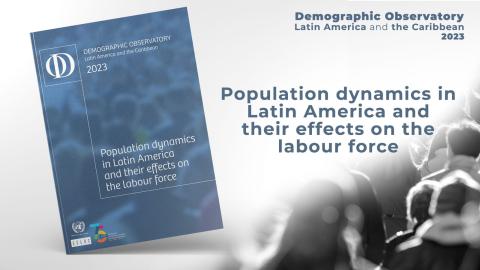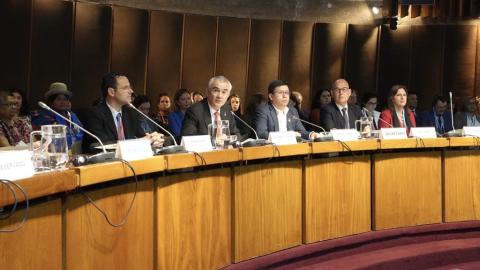Press Release
REMARKS BY MR. JOSÉ LUIS MACHINEA, EXECUTIVE SECRETARY OF ECLAC,
AT THE OPENING OF THE MEETING OF THE ECLAC SESSIONAL AD HOC
COMMITTEE ON POPULATION AND DEVELOPMENT
THIRTIETH SESSION
San Juan, Tuesday, 29 June 2004
Ms. Thoraya Obaid, Executive Director of the United Nations Population Fund,
Mr. Federico Meyer, Chairperson of the Ad Hoc Committee on Population and Development,
Ms. Marisela Padrón, Director of the Latin America and the Caribbean Division of the United Nations Population Fund,
Distinguished Ministers,
Distinguished delegates,
Representatives of United Nations agencies,
Representatives of civil society,
Colleagues and friends:
This meeting of the Ad Hoc Committee on Population and Development is a source of special satisfaction for ECLAC. Ten years after its establishment, in 1994, and eight years after its first meeting, in San José, Costa Rica, this body has become a leading forum for the exchange of views, the negotiation of agreements and the definition of joint actions on population issues in the region.
One important function of the Committee has been to steer the work of CELADE –our Population Division, which serves as the Committee’s technical secretariat– towards issues and actions that the countries regard as priorities. In addition, as part of its work, the Committee has asked CELADE to carry out specific studies and activities. Among the analyses that CELADE has produced at the Committee’s request are the documents “Population, reproductive health and poverty”, “Juventud, población y desarrollo en América Latina y el Caribe” and “Sociodemographic vulnerability”, which were prepared and submitted for the Committee’s consideration at the sessions held in Aruba in 1998, in Mexico in 2000 and in Brazil in 2002, respectively. In all three cases, CELADE responded to the Committee’s mandates with dedication, professionalism, and benefited from the strong support of the United Nations Population Fund and inputs provided by other ECLAC divisions.
The fact that the Committee’s meetings take place in the framework of the Commission’s sessions attests to the importance which ECLAC attaches to the close links between population issues and the economic and social development process. ECLAC firmly believes that these links, far from becoming less relevant, have taken on renewed significance in the light of the demographic transition currently under way in the region. Indeed, the position paper submitted by CELADE at the previous meeting of this Committee, held in Brasilia, dealt with the old and new risks associated with sociodemographic vulnerability. In short, ECLAC recognizes that there is a large, wide-ranging set of population issues that exert and will continue to exert a powerful influence on the course of economic and social progress in the region and among its inhabitants.
A few months ago, at an open-ended meeting of the Presiding Officers of this Committee, I referred to several of these issues, unders coring the need to broaden and deepen our understanding of them and, especially, to ensure that decision-makers, policy-makers and opinion-makers fully grasp their true magnitude and significance. Among the issues I mentioned were international migration, intergenerational relations, population ageing, gender balance and the family. In connection with each of these issues, I described some specific actions that are indicative of the way in which ECLAC has integrated them into its agenda.
I am pleased to report that, despite the short amount of time that has passed since that meeting, further progress has been made in incorporating population issues more extensively and profoundly into the Commission’s key proposals and interdivisional studies. A prime example of this, in relation to proposals, is the position paper on productive development in open economies that we are submitting for consideration at this session, since it acknowledges the opportunities and challenges associated with increasing international migration, the voluminous flow of remittances, slower population growth and lower dependency indices. Another manifestation of the importance we attach to population issues is the inclusion of a chapter on population in our biennial publication Social Panorama of Latin America.
While the subject of this chapter will vary from year to year, there will be a continuing emphasis on persistent sociodemographic inequalities in the region.
Furthermore, we are launching a more comprehensive project on migration that will involve not only CELADE but also other ECLAC divisions, as we believe that this area, in its various demographic, economic, social and gender aspects, is of special relevance to the region and should be given the priority it deserves.
With respect to the incorporation of population issues into the Commission’s interdivisional work, allow me to highlight the following examples:
(a) The second report on youth, whose chapter on population provides information not previously included on youth and adolescent health, reproduction and migration;
(b) A seminar on the family for the consideration of emerging issues in the areas of fertility, nuptiality and child-rearing;
(c) The follow-up to the Millennium Development Goals, particularly those referring to the reduction of maternal and child mortality, AIDS control and improvement of the living conditions of slum dwellers;
(d) The development of procedures for revealing gender inequities in all their facets, which were disseminated in publications in the Mujer y desarrollo series presented at the ninth session of the Regional Conference on Women in Latin America and the Caribbean, held recently in Mexico City;
(e) The studies and projects on international and internal migration that have been carried out or are currently under way, with the participation of various ECLAC divisions and offices;
(f) The growing tendency to explicitly consider sociodemographic issues in studies on sustainable development, human settlements and local and rural development, which has been facilitated by the possibility of processing census data and microdata through the REDATAM system developed by CELADE.
Another unmistakable sign of our emphasis on taking sociodemographic issues fully into account in our work is the new ECLAC/UNFPA Regional Programme on Population and Development in Latin America and the Caribbean, which receives generous support from the United Nations Population Fund and involves not only CELADE but also other ECLAC divisions and subregional headquarters. Speaking of the Population Fund, I should like to express once again our thanks to its Executive Director, Thoraya Obaid, and to Marisela Padrón for the support they have given us and continue to give us. It has been a real pleasure to work with you, and I look forward to continuing this valuable relationship in the future. In compliance with the mandate it received at the Committee’s previous meeting,
CELADE has prepared a position paper on population, development and ageing that gives an overview of issues relating to older persons in the region and analyses the challenges posed by the demographic transition, which is leading to the “greying” of the region’s societies. We are aware of the impact this process will have on our countries, and we therefore emphasize the need to act now to forestall the negative effects and amplify the positive effects of this inexorable demographic change. The biggest challenge is to create conditions for enabling society and its institutions to make timely adjustments to these new circumstances, with the aim of ensuring a good quality of life in old age.
In particular, we believe that the social security reforms implemented or considered by the region’s Governments should continue to include clear solidarity-based components.
It should be recalled that this Committee was established to provide a suitable institutional forum for evaluating compliance in the region with international agreements on population and development. The Committee has carried out this task rigorously and in a participatory spirit, faithfully reflecting the profound commitment of the Latin American and Caribbean countries to the implementation of United Nations agreements. In addition to monitoring the implementation of the agreements reached in Cairo in 1994, this Committee has been asked to follow up on the Regional Strategy for the Implementation in Latin America and the Caribbean of the Madrid International Plan of Action on Ageing, adopted at the Regional Intergovernmental Conference on Ageing held in November 2003.
Another sign of the renewed and broadened relevance of population issues is apparent in the agenda of this meeting. In addition to discussing issues of ageing, the Committee will consider two other key areas of vital importance for the fulfilment of the Millennium Development Goals: the interrelationships between population and poverty and the situation with regard to HIV/AIDS in Latin America and the Caribbean. The fact that the Committee is considering these issues clearly shows that the Programme of Action adopted at the International Conference on Population and Development is closely aligned and in harmony with the general guidelines set out in the Millennium Declaration.
The participants in this meeting of the Committee are about to embark on two days of intensive work. I am sure that, by the end of the deliberations, you will have noted with satisfaction that the region has strengthened its capacity to respond with unity, seriousness and responsibility to the complex and challenging economic, social, political and demographic circumstances it faces today and will face in the years ahead.
Thank you.


